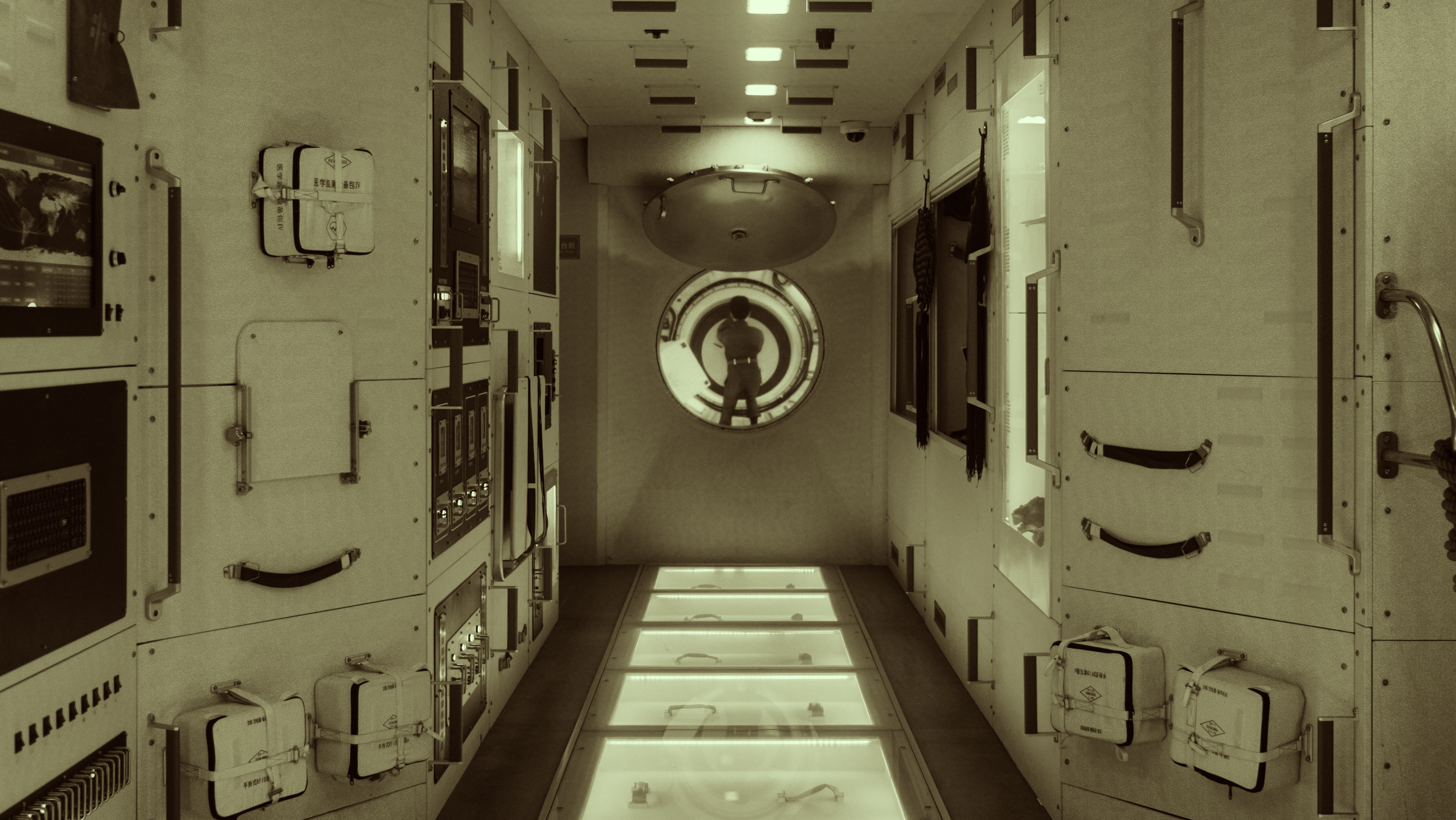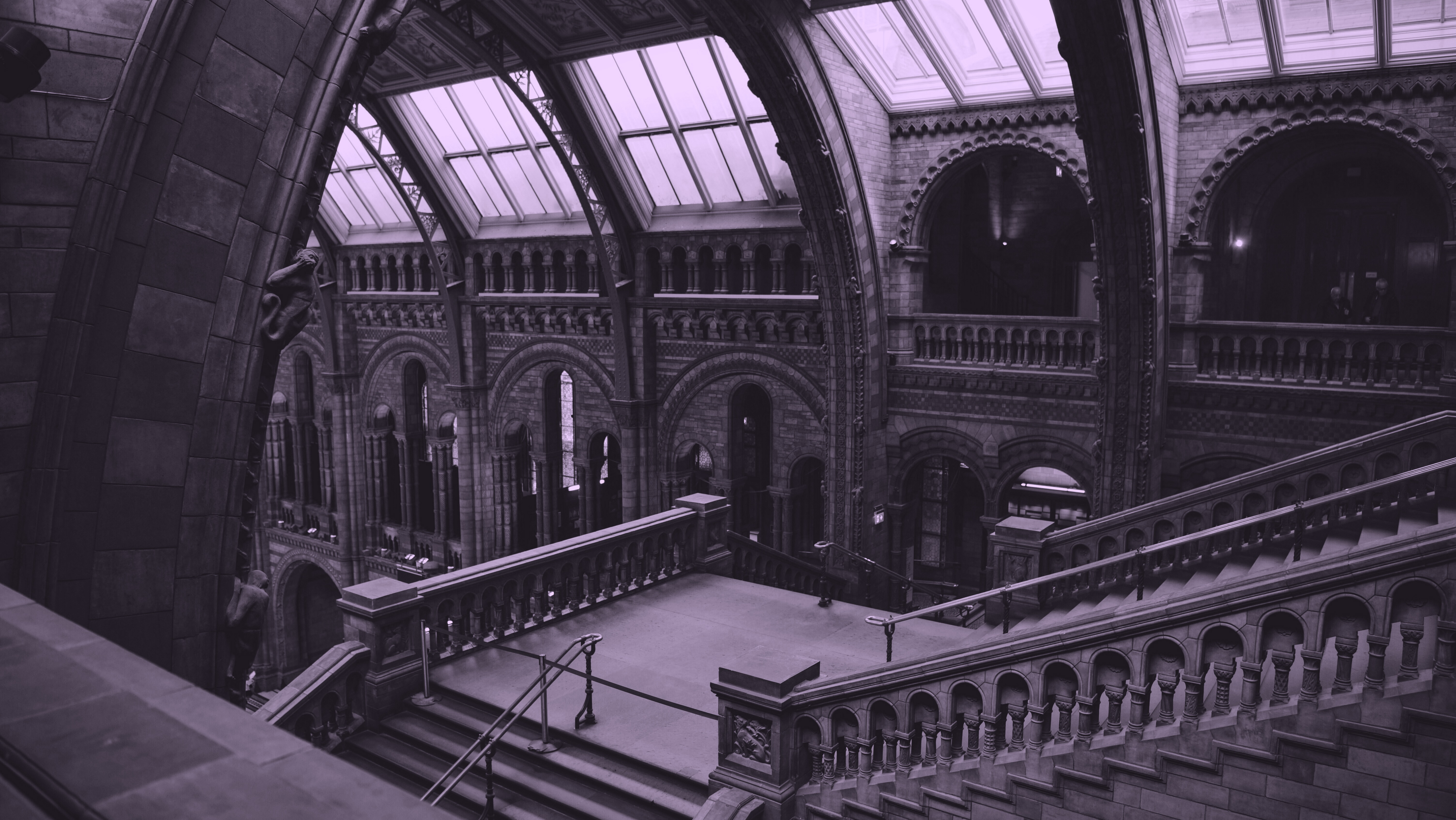Karina reread the night’s schedule, keying in on that elusive word all surgical residents at Mercy South dreamed of seeing on their shift assignments — surgery — listed beside her name. She scanned the corridor for another warm body to share the news with, her tiny frame dancing ever so slightly with excitement, but she was met only with the familiar whirring of AI units weaving from room to room, tending to patients. The lights above her flicked off, until she moved again, this time to trigger the motion detector.
She was only a month in at the hospital and she’d barely slept that whole time. She’d developed an insomnia-induced nausea that had compounded until it was too hard to keep her eyes open and all the coffee in the world couldn’t stave off that dull headache in the back of her skull. All her senses felt a little slower than she was used to. It was the nerves, she told herself. But Karina knew how lucky she was to be assigned to a surgical procedure this early in her employment, even if it was only to observe. She had to power through.
Her Grandpa was a sawbone. That’s what he used to call it, in that folksy self-deprecating kind of way everyone in Texas spoke. When she’d just started med school, he’d say, a sawbone was what they used to call a surgeon before all the prestige, and then he’d laugh and tell her how proud he was that she was following in his footsteps. And she’d go home and study harder than she had the last time she visited him for encouragement. She’d imagine what it’d be like to open a body, tuck into a sixteen hour surgery, sew them back up, and let their grateful families know they’d be okay. And then she’d imagine fixing what she knew was wrong inside herself, her insecurity. Her self-doubt. If only there was a procedure for that kind of thing.
Karina’s family wasn’t thrilled she wound up at Mercy South, least of all her Grandpa. He wanted her to follow his path to Johns Hopkins. But over and over, she told him in her meek voice that she didn’t have the grades or skillset for that, not to mention she’d never left Texas before. He’d lean back in his chair and, in quiet confidence, say child, a diagnosis is not a sentence. We get better with practice. Karina told him that AI hospitals were the future, whether they liked it or not, and that her job as a surgical resident was to offer human support that robots couldn’t. But he just sucked his teeth and mumbled about the good old days of sawboning. He thought he was some wise old medicine man, but the truth was, he’d ended up like a lot of other doctors, sued down to nothing and forced to move in with his daughter just as he hit retirement.
Karina stepped into room 310 and was immediately hit with the scent of dirt in the air. In the corner chair, a pair of worn boots stood beside a sweat-stained cowboy hat and a clear bag full of clothes. Mr. Pena’s eyes were closed but his face furrowed in some quiet pain. His skin was an unnatural tone of yellow that contrasted wildly with his greying hair. Karina picked up the chart at the base of his bed and studied the system’s report, a document that was sparse and efficient. Mr. Pena had only arrived at Mercy South two hours earlier, but the system had already performed a full diagnostic scan with blood work. Patients weren’t forced to wait hours to learn their fate anymore. During orientation, Mercy South shared a graph that showed a 36% increase in favorable outcomes post treatment when tests were administered by the system. Karina found that statistic comforting. The system caught everything and predicted every scenario so there were rarely mistakes.
“The hell am I?” Mr. Pena said groggily as his eyes slowly opened.
“You’re in a hospital, Mr. Pena. Mercy South,” she said.
“What? Speak up. I can’t hear you if you’re whispering.”
“You’re at Mercy South, Mr. Pena,” she said in a slightly louder voice. A pitch that was unnatural to her but one her Grandpa had always tried to encourage.
“Jesus Christ… I told the ambulance to take me to Bradford.”
“I assure you, you’ll have the same level of care here.”
“Except you’re all using robots.”
“Bradford has an AI surgical wing, too,” she said.
“Goddamn country’s going to hell,” he mumbled. “Surgery for what?”
She looked over his chart, reviewing lab results and preparing her words in the comforting tone she’d learned in med school, “You have a tumor attached to your liver,” she said.
He was quiet for a moment, before the quietest “fuck…” leapt from his lips.
“You’re in great hands, Mr. Pena.”
“Those things don’t have hands,” he shook his head. “Not like you and me. Makes me feel like a machine being operated on by a machine, you know that? At least when a person’s hovering over me, they just…they get what’s at stake.”
She nodded in the way the system taught her class at orientation. The system designed by Haxon | Lo that began as a promising advancement when she started med school. That matured as the AMA and Congress wrote a bill detailing how AI medicine could be achieved with human oversight. That calcified through lower healthcare costs, targeted treatments, AI patient care, AI drug administration, AI surgery. So by the time Karina graduated, most hospitals were 100% AI administered healthcare, and she was a quarter million dollars in student loan debt and not even close to the top of her class. But the system found value in doctors like her and employed her to provide what it couldn’t, to make each patient feel secure in the knowledge that it was statistically less risky to have an AI operate than a human.
“How long…?” Mr. Pena asked.
“The surgery? Six hours. Then you’ll recover here for a week or so.”
He sat up in his bed, and with a groan said, “No… no, that doesn’t… Dammit. I have something on Saturday. I can’t miss it.”
She stepped to the side of his bed and put a hand on his shoulder, like she was taught, “this is more important, Mr. Pena. Making you better is all that matters right now.”
“No. I promised my daughter I’d be there.”
“If you give me her phone number, I can call and tell her you’re here. So she can visit.”
“No,” he said sharply. “No. Not like this.” He looked out the door as an AI unit sped down the corridor, and he closed his eyes. “Can’t you operate on me instead?”
Karina smiled politely and shook her head, “Oh no, Mr. Pena. I’m really only here to observe and tend to patient needs.”
“Okay, then tend to my needs in surgery.”
“It’s really just emotional needs. But I’ll be in the operating room with you,” she assured him.
“So, the robots are doing the cutting?”
She nodded. “The system has a near perfect success rate in surgical procedures of this nature.”
He pursed his lips and studied her face, “Did the system tell you to say that or do you believe it?” Karina held her smile as she slowly digested his question. But Mr. Pena didn’t wait for her reply. He closed his eyes and his face furrowed again.
“I’ll be back to prep you for surgery,” she said in her weak voice. She poured him a glass of water and left him alone with his thoughts and the beeping machines all around him, stepping carefully out onto the blue ‘human’ line running the length of the hallway. Motion detectors flicked lights on as she walked to the elevators, an afterthought to her human presence.
The cafeteria was quiet overnight. All that was left were stale sandwiches and whatever was still in the vending machines. Karina’s Grandpa used to tell her that hospital food was a punch line, but she saw it as one of the perks of the job, even if it wasn’t very good. Food was more and more expensive every day. At least the hospital gave doctors meal vouchers with each shift. And the cafeteria was one of the only times she actually saw other doctors. Most of the time, she was surrounded by AI machines buzzing through the halls and she constantly felt like she was trying to cross busy highway anytime she stepped out of a patient’s room, the system warning over the intercom, keep to the blue line for your own safety. There was a time when doctors used to walk the halls with their faces angled into their clipboards, she remembered, and everyone weaved around them. But that time was a while ago.
She spotted Victoria and sat down across from her, laying out her vending machine sandwich and coffee. Victoria looked more tired than Karina, probably because she had a year of residency on her. When Karina started at Mercy South, Victoria would vent all about the AI transition, when all the doctors and administrative staff were let go over the course of a few months, replaced by Haxon | Lo robots. All except for a few of the resident who decided to stay for fear of losing out on the scarce jobs out there. And even though Victoria was lucky to be employed, she was always disparaging the system. Talking about how medicine needed a human touch. Karina found it entertaining at first, but over time her rantings made her nervous. She imagined how the system would react if it caught wind of Victoria’s criticisms. And if she would be implemented.
“Anything exciting tonight?” Karina asked.
“Gall stones and patient comfort,” she said, with that defeated sigh she’d perfected over her year at Mercy South. “You?”
“Mostly routine, but there’s a surgery tonight. Tumor removal.”
Victoria leaned in at the mention of the ’s’ word. Most doctors did. It was the only time they were really present during actual medical procedures. The system was required to have humans present and ready to assist if necessary. It was a law enacted by Congress to cover their asses in case a robot killed someone in the operating room. But they were quick to point out at orientation that it had never happened before. The system was too good at its job.
“Lucky. You excited to observe?” she asked. Karina nodded like she was admitting a secret.
Victoria tossed her crumbled napkin on her plate and sighed, “God, I miss being a doctor.”
“You’re still a doctor,” Karina said.
“No, we watch and we comfort. They don’t need us for any of the actual medical stuff.”
“They need us for the human connection,” Karina said, realizing she was quoting the Mercy South Hospital manual out of habit.
“I’ve wanted to be a doctor since I was a kid. I busted my ass through grade school, college, med school, for what? Not for human connection, Karina. I want to save lives.”
Karina picked at the bread of her sandwich, “Maybe move to Europe then. My Grandpa says they don’t do AI medicine over there. He says people still take care of people over there.”
But Victoria picked up her tray with all the emotional baggage she was carrying and said, “I gotta get back.” Karina watched her toss her tray into a cafeteria bot, sympathizing with her burn out. Starved of purpose, anything will eventually die.
Karina’s footsteps woke Mr. Pena when she returned just after midnight. She watched his expression dim as he found the clock on the wall and remembered what he was doing there.
“Surgery soon?” he asked.
“Yes, I’m just waiting for the anesthesiologist to come and prep you.”
“Is that an AI or a person?” he asked.
“AI,” Karina admitted.
“You’ll be in there?” he asked.
“The whole time,” she reassured him.
“My daughter’s supposed to come over on Saturday. I got these boxes in the garage, filled with all this old stuff her mother saved for her before she passed. I been trying to get her to look through ‘em for months, and we both kept pushing it off. Hard for both of us to look through that stuff. But she’s coming on Saturday finally and it’s important. She hadn’t seen either of us in years and I just really need to be there. You understand, Doctor…”
“Washington. Karina Washington.” He reached his leathery hand out and shook her’s.
“Washington. Karina Washington.” He reached his leathery hand out and shook her’s.
“Martin,” he said. “So, now you know what’s at stake.”
The anesthesiologist wheeled into the room and she pulled away, as the robotic cube parked itself on the opposite side of Mr. Pena’s bed and unfolded into its functional form.
“Good evening, Mr. Pena,” it said in a cold detached voice. “I am here to administer anesthesia for your surgical procedure.”
Mr. Pena looked at Karina for reassurance, and she nodded. “It’s okay,” she told him. And he believed her.
The anesthesiologist whirred as it mixed the appropriate combination of medicines in its center and forced them into a needle in its limb. It angled the needle into Mr. Pena’s IV bag and his eyes were fixed on Karina the entire time, until they grew heavy and closed. And she thought about how he talked about doctors in the same way Grandpa had. Human touch is what makes medicine so powerful, Grandpa used to say, without it there’s no real value to life.
There are strict rules in the operating room. Doctors are to be present and aware of procedures throughout, but are not permitted to interrupt or talk or otherwise distract the AI from their functions. Early on, doctors would hover over the machines during surgery, offering criticism to every cut and stitch. But the system found that method of shared responsibility inefficient. Surgeries were completed 20% faster by machines, and that went for routine procedures, as well. Doctors couldn’t keep up, so they were forced to the sidelines.
Mr. Pena’s concerns swirled in Karina’s head as she watched the many tubes running from his body, hovered over by a team of AI surgical machines. She wondered if he and her Grandpa were right, if medicine held power in its person to person connection like some bond that demanded humanity itself roll up its sleeves to preserve life. Not a gang of metal with their cold eyes and colder extremities cutting into Mr. Pena’s side with an even colder exactitude. She caught her breath. She was beginning to sound like Victoria. It was just his nerves getting to him, Karina thought. Most people, like Mr. Pena, are reluctant to go under the AI knife, but once they’re shown the statistics, they change their mind. And they ask all those invasive questions, wouldn’t you rather do the operating? Karina was taught to smile and tell them she’s lucky to be there at all. That she was lucky to be in the operating room, even if it was just to observe. If they see her confidence in the system, then they’ll warm to the system, as well.
Karina followed the checklist given to her by the system and watched along on the monitors, ticking off each step as the AI surgical machine entered Mr. Pena’s abdomen. There was no chatter, no music, just the whirring of machine parts as they maneuvered inside their patient. It wasn’t long before Karina saw Mr. Pena’s liver appear on the monitor… and that horrible tumor grafted onto its side. She had always found it strange the way a cancer metastasized and slowly drew life from humans until we cut it out ourselves.
Karina leaned into the monitor as the AI scalpel lowered to the tumor. But there was something wrong. She examined closer to make sure what she was seeing was correct, and she saw it clearly. The tumor that the surgical machine was slicing was attached ever so slightly to a hepatic portal vein. Karina flipped through the system report, but there was no mention of it. The system knew what it was doing, though, she thought. She needed to have faith. But the machine’s scalpel inched closer to the vein, and Karina felt her body beginning to shake. She knew that if it cut that vein, Mr. Pena would bleed out in seconds.
“Stop,” she felt herself commanding.
The surgical machine whirred to an immediate halt, as per law. If a doctor raised concern, the system had to take that concern into account before proceeding. It was the outer limit of Karina’s authority, and most doctors would never dare use it, but she couldn’t control herself. She knew a good doctor was supposed to separate themselves from the patient, focus on the task at hand, but she couldn’t shake Mr. Pena’s reunion with his daughter.
“What is your concern Doctor Washington?” the system asked.
“The hepatic portal vein. You’re about to sever it,” she offered.
The system whirred as it processed her concern. “There is no need for concern. The hepatic portal vein is not a factor in this surgery.”
She looked at the monitor again, confirming what she saw. “No, it’s…I’m looking at it. The tumor is latched onto it.”
“You are mistaken, Doctor Washington.” The surgical machine whirred to life and leaned back into Mr. Pena’s abdomen. The scalpel neared the vein.
“Stop,” she felt herself saying again, more forcefully that before.
“What is your concern, Doctor Washington?” the system repeated.
“You’re going to cut the vein. The tumor is attached to it,” she said with conviction.
“Would you like to discuss your concern with a supervisor?” the system asked. And she knew that question because she’d heard rumors of it before. Anytime a doctor spoke up about any concern, the system threatened a visit from a supervisor. An almost surefire way to get fired. It was a stain on a doctor’s record that followed them to any other AI administered hospital across the entire country. It was noted in a doctor’s file that they didn’t work well with AI, and if they didn’t work well with AI, then they weren’t working at all. But Karina took an oath, Do No Harm, same as every other doctor no matter how good or bad they were, and she couldn’t just let a man die on the operating table when there was a simple fix.
“Doctor Washington? May we proceed?” the system asked.
She wanted to say yes, or at the very least nod, but she was paralyzed.
When she graduated medical school, her Grandpa sat her down and told her all about the ups and downs of the profession he’d waded forty years through. Right out on her mother’s porch, he went on for hours about losing patients, saving lives, enduring hospital bureaucracy, all of it. She nodded and packed his advice away in the back on her mind, the same way she always had. The same way she had when she struggled through medical school at the middle of her class and watched the top students head off to major hospitals around the world, while she followed her future to Mercy South. But Karina heard her Grandpa clearly in that operating room, saying in his quiet confidence, a diagnosis is not a sentence. We get better with practice.
She found herself standing over Mr. Pena before she even realized she was there, as if she’d skipped a moment in time and just sprang into action. She pulled the scalpel from the surgical machine’s hand.
“Doctor Washington, a supervisor has been called to assist you,” the system said. And she picked up on the threat, but she couldn’t stop. She knew she was right.
Karina edged the scalpel into the abdomen and made a small incision at the base of the tumor so it avoided the hepatic portal vein. It was the smallest little cut to ensure Mr. Pena didn’t bleed to death. It was an action any medical student would’ve been confident performing. And all she could think of was how the surgical machine didn’t see what she saw. After all the tests and imaging, the system didn’t see that glaring error in its own operating plan. Karina made another cut and finished the procedure. She was working in harmony with this machine. She was confident others would see that, too. And she was hopeful for her future at Mercy South.
“Lift the tumor, slowly please,” she directed the surgical machines, and they followed her command. She checked Mr. Pena’s vitals. He was stable. She breathed a sigh of relief, until her eyes caught the face of Doctor Isaac staring at her through the door.
“Close him up,” she told them.
Karina peeled her mask off, her face revealing the smile beneath. She got to perform surgery, and it was a success. She was a success. Not in the offering supportive words to patients or comforting them after sharing a difficult diagnosis kind of way. She was actually responsible for saving a life. The feeling emboldened her, made her feel like her Grandpa, like a sawbone.
“What the hell was that?” Doctor Isaac said.
“The system made a mistake. I was correcting it,” she explained.
“The system doesn’t make mistakes, Doctor Washington.”
“But it did, and I stepped in. We were working together,” she said.
“We don’t work together, Doctor Washington. We observe. We’re present. That’s all.”
She stared at him, confused by how he could possibly take the side of an AI over a fellow flesh and blood doctor.
“We’re here to save lives, Doctor Isaac,. That’s what I was doing,” she said. But he only winced at her like she was some petulant child who wouldn’t stand straight or respect her elders.
“No, we’re here to support them saving lives,” he said, pointing to the surgical machines still working inside. “What you did was threaten a liability lawsuit against this hospital. If you had screwed up in there, not only would you be sued, but you would’ve exposed the hospital. And every other doctor working here.”
“But the surgical machine was going to fail. I prevented that from happening,” she said.
“Stop.” He put his hand up. “The system wants you gone.”
She tried to hide her stunned expression but it was useless. Let him stare, she thought. Let him see the look of a doctor who wouldn’t stand to be benched by some AI. Show him there were still doctors who could do more for human healthcare than a machine ever could.
“The system doesn’t know the cost of a human life,” she told him defiantly. And she hoped that would seep in as she turned and walked away, until she heard his voice call back to her, “it knows the cost. And that man in there was not worth a lawsuit,” he said. And she cringed.
Karina followed the blue ‘human’ line on the floor, watching machines administer medicine to patients and coldly run tests. Motion detectors flicked lights on as she marched to the elevators. Victoria spotted her from the aid station and waved and asked where she was going, and all Karina could think to say was, "Europe."








